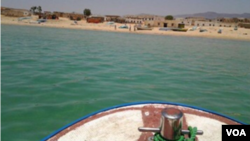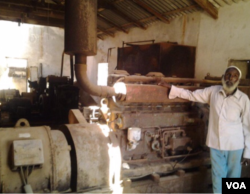One month ago, heavily armed militiamen who support the Islamic State (IS) militant group walked into the Somali town of Qandala and seized it without opposition. The town on the Red Sea became the first piece of land controlled by pro-IS forces in Somalia.
Qandala emptied out quickly, its several thousand residents fleeing in small groups by car and on foot. But one man tried to stay put, to protect the buildings he considers a treasure: the town's old fish processing plant.
His holdout ended Wednesday, when relatives evacuated Mohamud Yasin Yusuf, known as Justo, by sea, during the nighttime hours.
“They came to find my body because they were told that I was killed," he told VOA's Somali Service. "When they found me alive it was unexpected.”
“I didn’t want to leave the town," added Yusuf, 76. "I never left it for one night.”
He said pro-IS fighters came to the plant, took pictures and asked him about what he does, how he works, and then left. “People are scared of them but they did not cause any problems for me,” he said.
But relatives feared for Yusuf's life. He was the last remaining resident in town, they said, and could get caught up in the fighting if foreign armies or forces from Somalia's Puntland region try to take back Qandala from the clutches of IS.
Efforts to recapture the town have not started, and Somali officials believe it will be tough. The town is located between the sea and large mountains where militants have erected defenses. Puntland forces could storm it with a sea landing but holding it will be costly, experts warn.
66-year connection
Yusuf started working at the fish processing factory as a dishwasher in the kitchen in 1950, when he was 10 years old. The plant was then owned by Italian colonists who ruled Somalia. In 1958 he started his first shift in the plant outside the kitchen. From there, he worked his way up until he became the general manager.
The factory continued to operate for two years after the Somali government collapsed in 1991 and the country sank into violence and lawlessness. Yusuf says operations were stopped at that point due to a lack of maintenance and care.
But Yusuf treated the plant — comprising some 30 buildings for offices, residences, and shops for boats and fishing equipment — as his own property, protecting it from looting.
“We have the technique but it lacks maintenance,” he said.
Still, he continued to inspire others to go fishing. Although the plant was producing limited fish for domestic conception, and sometimes friends and family would bring their fish to him to be canned, it no longer has the capacity for commerical production.
In 2014, a tropical cyclone hit the area and washed away Yusuf's last functioning motor boat, together with some fishing equipment. He informed Puntland Region officials, who assessed the damage but never followed up with money or repairs.
Tasty fish
His relatives have brought him to Bosaso, 80 kilometers west of Qandala. But his thoughts remain with his home town.
Yusuf says the factory means so much to him that he wants to hand it over to the Somali government one day.
“I’m very proud of what I did about it, and I never been away from it one kilometer,” he said.
He says he saw the plant at its peak, when it won excellence awards and produced tons of fish, and in its worst days, when he was the only person roaming around the giant compound.
He says what he will miss most is the tasty fish of Qandala.
“It has distinctive taste of nostalgia,” he said. “If you try to wash it off with a soap and then spray perfume, you can still smell it.”





